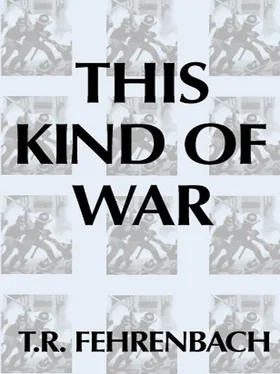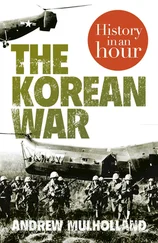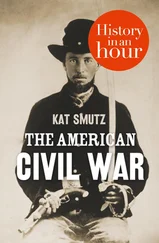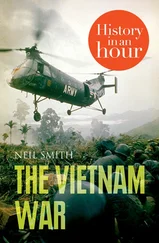The Russians would not cooperate with American attempts to rebuild the South. Worse, they meddled. They fomented economic disorder and political protest. They demanded conferences, and requested joint commissions. If a commission met, they made demands. If the demands were met, they made further demands. If something was asked of them, they yelled, "Unfair!" picked up their marbles and went north. In short, they acted as Russians had acted around the world since the war.
Finally, Military Government in Korea quit trying to do business with them. General Hodge was criticized for this inflexible attitude; the world had not yet learned that it is completely impossible to do business with Russians except from either a position of power or upon Russian terms.
Soon enough, the Director of Mining Industry and Engineering found that his job was not all gravy. The Koreans working for him tended to be temperamental and sullen. Some of them thought they knew as much about mining industry and engineering as he did. None of them could distinguish between right now, tomorrow, or next year, when asked to do something.
Nor was the living exactly high, even on directorate level. Winter came, and Charles Fletcher had to wear overcoat and gloves at his desk. Once, as an experiment, he put a glass of water on his space heater. The water turned to ice. Two weeks later, checking, he found it was still ice.
His wife had servants, but she had to cook on a wood range. The range was used for heating the house, too. Often, Charles Fletcher found it expedient to stay late at the office, even in gloves and overcoat.
The Army did what it could, but in 1946 Korea was logistically at the end of the line. Most Army equipment had been diverted to surplus sales, to ease the screaming civilian demand for goods, and short of war, there was likely to be no new appropriation.
At his desk one day, Fletcher heard that there was trouble in Samch'ok, on the east coast. He left his office in Seoul to investigate. At a company iron-ore mine, he found agitators were encouraging idle workers to carry away company property. He had the Korean Special Police arrest the agitators, and beat hell out of them.
Back at Seoul, there was some criticism—but nobody had a better idea.
The policy now became one of giving Korean nationals control of the company. The new executives learned some things quickly. They became adept at losing company property, mostly into their own pockets.
Meanwhile, a crisis developed with the Russians just across the border from Seoul Province. The waters that irrigated company rice paddies flowed down from the north, and suddenly the Russians dammed them off. The company agricultural adviser, PFC Peavey, was sent up north to investigate.
The Russians were not offended by negotiating with a PFC. They had political officers masquerading in low ranks in their own forces; they understood perfectly Gospodin Peavey's desire not to appear conspicuous. They sat down with Peavey and informed him they wanted a portion of the company's rice harvest in return for the water.
Peavey argued awhile. Finally, getting nowhere, he figured, what the hell? He was due to rotate out any day and become a civilian. He agreed to everything. He returned to Seoul, and soon the water flowed south.
When asked how he had outwitted the Ivans, Peavey would only smile gently. A few weeks later, he sailed for the States.
When fall came, the Russians asked for their rice. Military Government, of course, with some confusion, explained why they couldn't have it.
Next summer, the New Korea Company had a hell of a time getting water.
Meanwhile, political organizations and parties were springing up all across the South. Most, like the Full Moon Mating Society, had small success, unless that faction had something to do with the exploding population.
Through a hassle for power, a group of conservatives led by Dr. Syngman Rhee were gradually consolidating their hold on the country. General Hodge himself personally disliked Rhee, who could be both cantankerous and autocratic, but Rhee had a big lobby in Washington. A Christian, he had the missionary group behind him.
And the choice was not between Rhee and middle-of-the-roaders. Outside the Anglo-Saxon countries, there are few middle-of-the-roaders. It was, to Fletcher, a choice between right and left.
Charles Fletcher's daughter was born in Korea, and shortly afterward he was sent home. He did not feel that he had done a good job, although he had tried to do his best. But the country was just too damn poor, too primitive, too temperamental, too stinking, for Americans to like or understand. Charles Fletcher had become aware that few Americans, forced to live for an extended period in a land without safe drinking water or plumbing, can keep both equilibrium and an open mind.
By 1947 the Government of the United States, as well as the men still stationed in Chosun, was sick of the Korean problem. A great deal of effort had been made; a great deal of money had been thrown at it; but the problem wouldn't go away.
As long as Military Government remained, South Korea would remain in chaos; no lasting solution to the country's ills could be made. And the forty-five thousand men tied down there were desperately needed elsewhere by the shrunken American ground forces.
And the Korean problem could not be solved of itself; it was part of a larger problem: that freezing of boundaries and attitudes men were beginning to call the "cold war." It had become obvious to many men in Washington that the world was split between two hostile groups, that the danger of a collision was increasing, and that something must be done, either to ease the tension or to strengthen the largely disarmed West.
But the deadly weakness of the Truman Administration was that Truman's domestic supporters, in the main, were indifferent to foreign policy. And domestic leaders of the Democratic Party were totally unfit by training and inclination for playing roles in foreign affairs. In general, Republicans, even of the liberal sort, left Washington at the end of the war, and businessmen would have nothing to do with the Administration. To execute his foreign policy Truman was forced to fall back on the great foundation bankers, who were largely isolated from the mainstream of American liberal tradition, soldiers, and career diplomats. On the whole these men, the Marshalls, the Clays, the McCloys, Forrestals, and Kennans, were professional, patrician, and conservative, much in the way the proconsuls of the early Roman Empire must have been: they disliked the violent enthusiasms sweeping the postwar world; they desired above all else order; and they were instinctively and instantly hostile to world Communism.
Their thinking, on the whole, was concise and clear, but it was unfortunately thinking isolated and often opposed to the thinking of the bulk of the American people. During the war, some members of the government had made an incalculable mistake: they had propagandized the Russians as heroic brothers-in-arms, indicated to the public that Stalin and associates were democrats at heart, and led the people to believe that Russia had fought the war from motives as pure as America's own.
All of which, even as early as December 1945, had been proved nonsense—but many people still believed it. Fortunately, there was government by consent of the governed in America—but just as unfortunately, such governments dearly hate to admit a mistake. The image of the Russians was not corrected.
The problem was that America had fought the war—as she had most of her wars—as a crusade, while Russia had fought first for survival, then for power. Crusades are usually inconclusive; it was no accident that Russia won the peace.
And it was no accident, in the late forties, that the makers of American policy, unwilling to backtrack with the public, began to try to isolate foreignpolicy decisions from public and Congressional control . The great decisions—the Marshall Plan, the Truman Doctrine—that gave the earth a hope of eventual order were not instantly popular with the American people. There was no great attempt to sell them—it was significant that every historic decision of the Truman Cabinet was debated by Congress only after it had been made irreversible. The makers of foreign policy, not by accident, universally held Lockean notions of federal executive power; and, not by accident, they escaped the popular will.
Читать дальше












